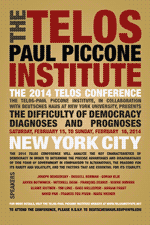The following paper was presented at the Eighth Annual Telos Conference, held on February 15–16, 2014, in New York City.
 Two french communist authors recently devoted a book to an attempt at the systematic demolishment of the logic of democracy. What makes their gesture interesting is that their critique of democracy is made in the very name of autonomy, equality, and emancipation, that is, of the very principles that democracy is supposed to promote and uphold. One usually knows how to react to attacks on democracy coming from the other side, from those who ground their arguments in a celebration of some sort of hierarchy principle, those who deduce the political from an ontology of violence, or aim at naturalizing orders and political differences. In those cases there is usually not much to be said at all, because anti-democratic arguments are usually not recognized as belonging to the same conversation as democratic ones: when they are actually heard, anti-democratic arguments are usually subject to different logics of validation, enunciation and justification than democratic ones. This is for instance what the notion of extremism generally does: to locate a voice or an argument outside of the recognized universe of discourse, and hence somehow deprived of an equal standing, possibly subject to some version of the old Jacobin motto: “there shall be no freedom for the enemies of freedom.” The paradox is interesting in itself, because it betrays the presence of a certain politics of thought and speech that is already at work way before we get to discuss in a rational process the truths of political forms, and yet has substantial effects on what is heard (and not heard) in the supposedly transparent sphere of public discourse. It also forces us to recognize the recurring, foundational role of the limit, of the gesture that at the same time opens up and delimits the space of what is possible and what is acceptable, which is often overlooked or simplified in the context of democratic theory.
Two french communist authors recently devoted a book to an attempt at the systematic demolishment of the logic of democracy. What makes their gesture interesting is that their critique of democracy is made in the very name of autonomy, equality, and emancipation, that is, of the very principles that democracy is supposed to promote and uphold. One usually knows how to react to attacks on democracy coming from the other side, from those who ground their arguments in a celebration of some sort of hierarchy principle, those who deduce the political from an ontology of violence, or aim at naturalizing orders and political differences. In those cases there is usually not much to be said at all, because anti-democratic arguments are usually not recognized as belonging to the same conversation as democratic ones: when they are actually heard, anti-democratic arguments are usually subject to different logics of validation, enunciation and justification than democratic ones. This is for instance what the notion of extremism generally does: to locate a voice or an argument outside of the recognized universe of discourse, and hence somehow deprived of an equal standing, possibly subject to some version of the old Jacobin motto: “there shall be no freedom for the enemies of freedom.” The paradox is interesting in itself, because it betrays the presence of a certain politics of thought and speech that is already at work way before we get to discuss in a rational process the truths of political forms, and yet has substantial effects on what is heard (and not heard) in the supposedly transparent sphere of public discourse. It also forces us to recognize the recurring, foundational role of the limit, of the gesture that at the same time opens up and delimits the space of what is possible and what is acceptable, which is often overlooked or simplified in the context of democratic theory.







